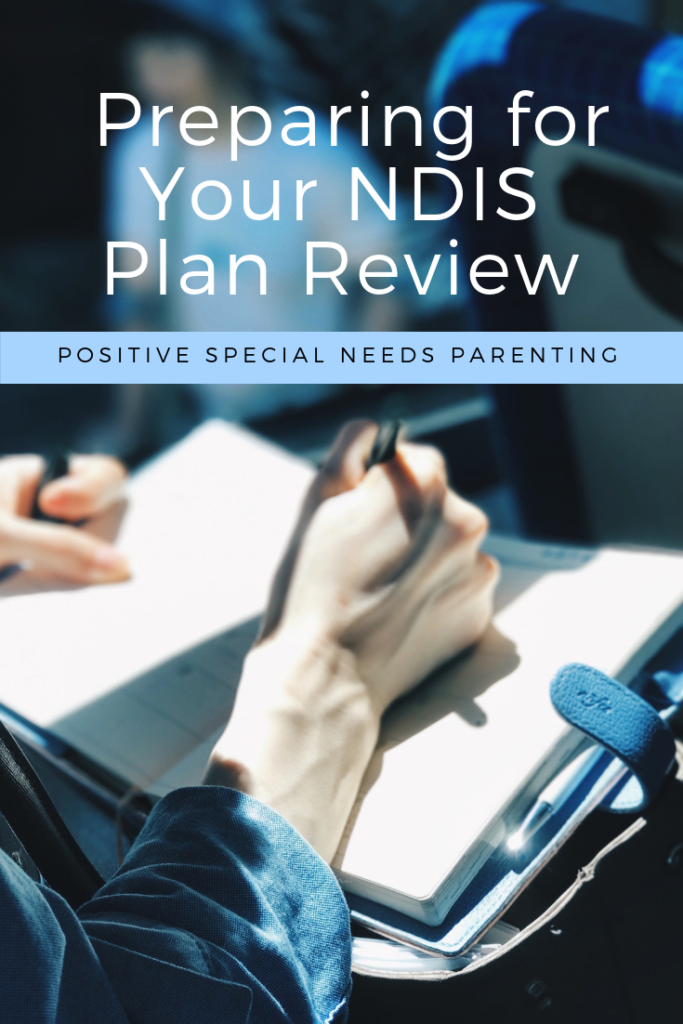We’ve just survived another NDIS Plan Review.
These meetings are held annually to re-visit the needs of the participant, review their goals and put together a plan for the coming year. We’ve been having these meetings each year since we entered the scheme in December 2013. While it can seem intimidating, these meetings are an important part of the NDIS scheme, giving both parties the chance to regularly improve and refine plans, so they deliver the best outcome for participants.
As the scheme stuggles under the needs of more than 200,000 participants nationally, it’s becoming more important to fully justify all requests for support. This means you need to be fully prepared before each plan review meeting, so the NDIA (the agency managing the NDIS) has all the information at hand to approve the supports you request for the coming year.
After speaking to three NDIS planners, and having the benefit of attending 8 review meetings between my two participants, I’ve identified 5 ways to prepare for your next NDIS plan review meeting. Doing these 5 things will give you an improved chance of success when requesting supports and will give the NDIA all the information they need to make an informed decision.
5 Ways To Prepare For Your NDIS Plan Review
Check the myplace NDIS Portal
The NDIA describes the myplace portal as “a secure website for participants or their nominee to view their NDIS plan, request payments and manage services with providers.” The portal provides valuable information on plan usage, service bookings, referrals, claimed services and a whole lot more.
In the week leading your your next NDIS plan review, check the following information available in the myplace portal:
- my contact details: check these details are correct and choose who you share this information with (you can find this information from the portal home page by choosing ‘my contact details’).
- my plan: print out the current NDIS plan so you can refer to it in the meeting (you can find this information from the portal home page by choosing ‘my plan’ then ‘view plan’).
- my support budget: note down what has been spent, what areas have been used and what funds remain (you can find this information from the portal home page by choosing ‘my plan’ then ‘my support budget’).
- my service booking: note down the providers with active service bookings who are currently able to draw from the plan (you can find this information from the portal home page by choosing ‘my service booking’ then ‘view service booking’).
Review the Current Plan
A big part of the review is re-evaluating the current plan and identifying updated goals for the coming year. It’s important to look at the following parts of the plan – Part 1: About Me; Part 2: My Goals; and Part 3: My Supports. Read over your copy of the current plan and have a think about the following questions:
- About Me: have any personal circumstances changed in the last year? (change in household makeup, death in the family, additional diagnoses, etc.)
- About Me: does daily life still look like this for the participant?
- My Goals: are the goals listed still relevant?
- My Supports: how have the supports listed in the plan helped the participant meet these goals during the current year?
- My Supports: are there any services/supports that are missing in the plan?
- My Supports: are you happy with the administration of the current plan? (agency-managed, plan-managed, self-managed).
Understand Current Plan Usage
It’s important to understand how the current plan has been used and have explanations where funds have been under-utilised or over-utilised.
If there’s an identified shortfall in a given area, ask for extra funding in the new plan to avoid a shortfall in the coming year. Ensure this request is supported by an accompanying therapist report, to give the NDIA proof this funding is a reasonable and necessary support.
Likewise, if the NDIA see you haven’t used all the supports available in a specific area of the plan, they may question the need to fund this at the same level in the upcoming plan. if there is a reason for funds not being used, provide a full explanation.
For instance, in our current plans, core funds have been under-utilised as our providers (and us) struggled to access these funds online. It turns out that this part of the plan is set to be self-managed, while the rest of the plan is agency-managed. Now we know, we can finally utilise these funds and the NDIA can see they are still reasonable and necessary.
Another example – we’ve accessed psychology services through a provisional psychologist, who charged .05 of the scheduled fee. While we’ve utilised the sessions as planned, it appears that we haven’t, due to the large balance remaining in our support budget. Providing a reasonable explanation to the NDIA should ensure supports continue to be provided as required.
Identify Goals for the New Plan
Once you’ve reviewed the current plan, it helps to then ask yourself additional questions to identify updated goals and support needs for the coming year:
- does the participant have specific goals they’d like included? (even if your kids are young, ask them what they think – they need input into these discussions from an early age to develop self-advocacy skills – it is their plan, after all!)
- are there life events coming up that may require more supports? (transition to high school, transition to work, moving house, travelling, etc.)
- do new or additional service providers need to be brought on board?
- are there new areas you wish to focus on – how can these be linked to a goal?
- have therapists or specialists identified areas of focus that should be included?
List potential goals in dot points before the plan review meeting so you have these ready to go. The LAC or planner will work with you during the meeting to incorporate these points into your updated goals. It’s so much easier to clearly state your goals and have a productive meeting when you’ve taken the time to think about these beforehand. It also reduces the chance of anything being forgotten or overlooked.
Request Therapist Reports
Without summary reports from therapists, it’s going to be an uphill battle to secure the supports you need in the new plan. Therapist reports should state what they have been working on with the participant, how these activities align to their goals, what progress has been made and what supports are needed into the future.
Try to give your therapist enough notice so they can have the report ready for the meeting. If this is not possible, negotiate with the therapist to provide their report within a week of the plan review meeting. These reports provide vital evidence to the NDIA and are crucial in proving that the supports you request are reasonable and necessary.
All therapist reports should include the following information, to make it easy for the NDIA to make an informed decision:
How is the support related to the child’s disability? – what is the impact of the child’s communication/social/living skills/physical barriers on their life? What is it stopping them from doing?
What exact skills has the therapist been working on? – not just “social skills” it needs to state “initiating conversations, taking turns.”
What has been achieved in the past year? – is the therapy working? What is the evidence of this? What can the child do now that they couldn’t do before because of this particular therapy? How has this improved their life?
What strategies has the therapist used? – if it all possible get a copy of the support plan the therapist is using – this provides us with evidence that it’s actually this therapy that’s increased the skill, not just getting older.
What still needs work? – what are the goals for next year? How do you expect to measure them?
How do you intend to work on that? – what’s the plan for next year? What strategies will you use? How will it be different to this year?
What informal supports have been utilised? – have you taught the parents any skills? Has the child joined a sports or social group?
Why is continued individual therapy required? – can group therapy be considered, if not why? Why can’t strategies be used in the home?
Taking the time to fully prepare for your next NDIS plan review meeting will give you the best chance of accessing the supports you need. No outcome can be guaranteed. However, my experiences with the NDIS/NDIA have been largely positive over the years, thanks to this process of preparation, review and planning.
What do you do to prepare for NDIS plan review meetings?

This post is part of our new series “5 Things Special Needs Parents Should Know”. If you’d like to submit a guest post, or if you have a topic you’d like covered as part of this weekly series, send your idea to kirsty@positivespecialneedsparenting.com


What a great, informative post! And very educational for people like me, who don’t have to go through these things, and don’t know how difficult it can be (or at least how much work goes into every review on the parents’ part). #LifeThisWeek
It sounds like so much work! Do you have to have separate appointments with each practitioner to get the reports for the plan, or is it becoming standard now so they can just email something through to you?
I admire and appreciate how much work you put into this post, this series, and this blog Kirsty! It is such a wonderful and valuable resource for parents of special needs kids. As you know, I have an aspie son. He’s an adult now and thankfully doing very well. I would have very much appreciated a resource such as what you provide back in his schooling days when things were quite a bit tougher.
Oh this is so good. I would be wanting to follow your advice for sure and you set it out in such a a way it must help you and others. I still ‘do not get how it all works’ because it was started in different ways and areas and as someone who likes consistency it seems less that straight forward! But you nail it.
Thanks for linking up for Life This Week. Next week’s optional prompt is What I Have Learned Lately. 15/10/18. Denyse.